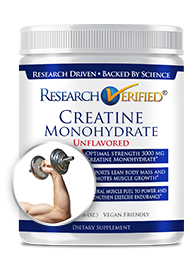Are you a beginner interested in taking creatine? Curious about what it is? Are you wondering how to incorporate it into your life? If so, this creatine FAQ is for you! We’re breaking down the basics to help you understand how to take creatine for the best possible results. Get ready to learn all the answers about this workout supplement.
What is creatine?
Creatine is a naturally occurring compound that is mainly stored in the muscles. It is produced by the liver and kidneys. It can also be obtained through the diet by consuming meat and fish.
The primary function of creatine is to supply energy to the muscles. When you perform a short, intense activity, your body uses a chemical compound called ATP (adenosine triphosphate) to provide energy to your muscles. However, your body has only a limited amount of ATP, and it depletes quite quickly.
This is where creatine comes in. It helps regenerate ATP, which means that you can exercise for longer before getting tired (1). It can also increase the amount of water stored in the muscles, which can help to enhance their size and strength (2, 3).
Many athletes and bodybuilders use creatine supplements to help boost their performance and muscle gains (4). However, it is important to know the best way to utilize creatine, as well as any potential side effects or interactions with other medications. In the next sections, we will answer some of the most common questions about using this supplement.
Supercharge your Sessions With Research verified Creatine Monohydrate
Is Creatine Good For Beginners?
Yes. For individuals new to fitness or strength training, creatine supplementation can offer a range of benefits that may enhance your workout performance. Creatine is one of the most well-researched supplements available and is primarily known for its ability to improve power output, especially in high-intensity, short-duration activities like weightlifting or sprinting. By helping your muscles regenerate ATP (adenosine triphosphate), the primary source of cellular energy, creatine allows for improved performance and quicker recovery between sets, potentially leading to faster gains in strength and muscle size.
What Is the Best Way to Take Creatine?
There are a few different methods that you can try with this supplement. Here are some of the most common ways:
1. Loading: This method involves taking a higher dose for the first few days of use, typically around 20 grams per day (loading phase). After the loading phase, you can then switch to a maintenance dose of 5-10 grams per day (maintenance phase). Some people believe that this loading method quickly saturates your muscles with creatine, which can lead to faster results.
2. Daily maintenance: This method involves simply taking a consistent dose every day, typically around 5-10 grams per day. This is the most common method, and it is effective for most people.
3. Cycling: Some people choose to cycle their creatine intake. This means they take it for some time (such as 8 weeks), take a break from it for a while (such as 4 weeks), and repeat. This may prevent your body from becoming too accustomed to the supplement, which can decrease its effectiveness over time.
Can I take creatine on an empty stomach?
You can take creatine on an empty stomach. However, it is better taken with a meal that contains carbohydrates, as they can increase its absorption in your body. Carbohydrates cause insulin levels in the body rise, which in turn helps muscle cells absorb creatine more effectively (5). This is why many experts recommend taking it with a meal or a carbohydrate-rich drink, such as a sports drink.
It’s important to note that taking creatine on an empty stomach does not lessen its effectiveness. It may just take a little longer for your body to absorb it.
Can I take creatine before bed?
Yes, you can. While many athletes and fitness enthusiasts take creatine before or after their workouts, timing isn’t critical. The key is to take it consistently, every day, regardless of the time.
Keep in mind that some people may experience difficulty sleeping when taking creatine before bed due to its potential stimulatory effects. If this is the case for you, try taking it earlier in the day instead.
Ultimately, when to take creatine is a matter of personal preference and what works best for your body. Just be sure to stay consistent and take it every day for optimal results.
Research verified Creatine Monohydrate – Maximize Your Muscles
Does creatine cause constipation?
While there is anecdotal evidence that creatine may cause some digestive issues for certain individuals, there is no evidence that it causes constipation.
If you do experience constipation, it may be a result of not drinking enough water. Therefore, it is recommended to take creatine with at least 16-20 ounces of water or other fluids. It is also important to choose a high-quality creatine supplement that does not include additives that could cause digestive issues.
Additionally, some people have reported mild digestive issues like gas or bloating (see below). This can usually be managed by taking smaller doses or dividing the daily recommended dose into multiple servings. It is also important to note that these side effects typically subside after a few days or weeks of consistent use (6).
If you experience any digestive issues, it is important to consult with a healthcare provider to rule out any underlying medical conditions. Overall, creatine is generally safe and effective when used as directed and with proper attention to hydration and digestive health. It is always advisable to talk to a healthcare professional regarding when to take creatine and adjusting the dose for individual needs.
Does creatine make you bloated?
Some people may experience bloating due to the increased water retention that can occur with creatine supplementation. Essentially, creatine pulls water into the muscles to improve their overall function. This can result in some initial weight gain as a result of water weight and, in some cases, bloating.

Fortunately, there are ways to minimize or avoid bloating. One strategy is to increase your water intake. Drinking more water can help flush out excess fluids and reduce bloating. Additionally, it’s important to avoid excessive salt intake as this can exacerbate water retention.
Another consideration is the type of creatine you’re using. Some forms, such as creatine ethyl ester, may be more likely to cause bloating than others. Creatine monohydrate, on the other hand, is a more well-studied and widely-used form that is less likely to cause bloating (4).
Overall, bloating is a potential side effect of creatine supplementation, but it’s not a guarantee. By staying hydrated, avoiding excessive salt intake, and choosing the right type of creatine, you can reduce your risk of bloating while still reaping the benefits of this popular supplement.
Achieve Peak Performance With Research verified Creatine Monohydrate
Does creatine cause headaches?
One of the potential side effects of taking creatine is headaches. However, this is not a known side effect associated with creatine supplementation.
Possible causes of a “creatine headache” are dehydration and overexertion. It is important to make sure you are staying properly hydrated and not pushing yourself too hard during your workouts.
It is also possible that the headaches may be caused by something else entirely. If you experience persistent or severe headaches, we recommend consulting with a healthcare professional.
Can I take creatine and collagen together?
Yes, you can take creatine and collagen together without any adverse effects. Collagen is a protein that is found in our bones, skin, and connective tissues. It is an important component in keeping our skin healthy, joints flexible, and bones strong. Creatine, on the other hand, is a molecule that helps in providing energy to our muscles.
The good news is that you can safely take collagen and creatine supplements together. Collagen supplements can even help to enhance the benefits of creatine. Studies have shown that collagen can improve muscle strength and joint flexibility, as well as reduce the risk of injury. Collagen supplements also support healthy skin and hair, which can be important for those who engage in rigorous exercise.
Can women take creatine?

Yes! In fact, there are many benefits that women can enjoy from taking creatine (7). These include increased muscle strength, endurance, and power. It can also help with fat loss and improve recovery time after exercise.
There are some misconceptions that creatine is only for men or that it can cause unwanted side effects in women. However, studies have shown that women do not experience any negative effects. It is generally safe for both men and women.
Can I take creatine while pregnant?
The use of creatine during pregnancy is NOT recommended. There is currently insufficient evidence on its safety for pregnant women and developing fetuses.
If you are pregnant or planning to become pregnant, it is always best to speak with your healthcare provider before starting any new supplement or medication. They can provide personalized advice and guidance based on your individual health needs and circumstances.
What Is The Best Creatine Supplement?
Whether you’re a pro or a beginner, we highly recommend you check out Research Verified Creatine Monohydrate. It contains an optimal serving size of 5000 mg, plus an availability enhancer (BioPerine®) for faster results. That’s it. No additives, sweeteners, or anything that might dilute the product’s efficacy. Research Verified Creatine Monohydrate is designed to dissolve easily into your drink and absorb quickly into your body. It also comes with a scoop for convenience. But the best part about this product is that it comes with a 365-day money-back guarantee. That’s right – you have an entire YEAR to try out this product and decide if it works for you. If not, you can return it and get your money back! But trust us – you won’t want to return this one.




